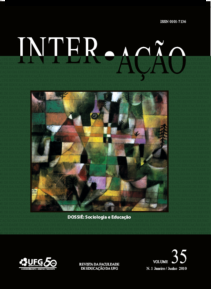THE SOCIOLOGY OF CHILDHOOD AND THE EDUCATION OF CHILDREN
DOI:
https://doi.org/10.5216/ia.v35i1.13144Keywords:
Sociologia da Infância, Representações, educação das criançasAbstract
The aim of this article is to present some theoretical reflections on the Sociology of Childhood and discuss the repercussions of this new subsection of Sociology for understanding and educating children. So a bibliographic review is undertaken to present an overview of the evolution of childhood representations, observe the perspectives of empirical investigations on children and identify the predominant socialization model of the present time. As a result of social transformation and of the representations and new modes of socialization, a “transnational childhood” comes about, characterized by mobility, network communication and the use of artifacts, because a child is active, has its own identity and is at the same time subject and social actor. Consequently, the educator/learner relationship should be characterized by protection of freedom, encouragement of dialogue, all of which is possible only if authority is exercised in a ‘horizontal’ manner.Downloads
Downloads
Published
How to Cite
Issue
Section
License
Inter-Ação uses the Creative Commons Attribution 4.0 License for Open Access Journals (Open Archives Initiative - OAI) as the basis for the transfer of rights. Open access means making documents available on the Internet free of charge, so that users can read, download, copy, distribute, print, search, or link to the full text of documents, process them for indexing, use them as input data for software programs, or use them for any other lawful purpose, without financial, legal, or technical barriers.
Authors publishing in this journal agree to the following conditions:
1) Authors retain copyright and grant the journal the right of first publication, with the work simultaneously licensed under the Creative Commons Attribution License, which permits redistribution of the work with attribution and first publication in this journal.
2) Authors are permitted to enter into additional, separate agreements for non-exclusive distribution of the version of the work published in this journal (e.g., for publication in an institutional repository or as a book chapter), with attribution and first publication in this journal.
3) Authors are permitted and encouraged to publish and distribute their work online (e.g. in institutional repositories or on their home page) at any time before or during the editorial process, as this may generate productive changes as well as increase the impact and citation of the published work.















